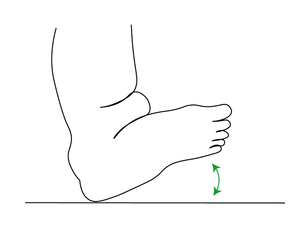Pes calcaneovalgus
From WikiLectures
Pes calcaneovalgus is the most common congenital malformation of the foot (accounts for 30-50%). It is more common in girls, first-borns and children of young mothers (solid uterine wall).
Clinical picture[edit | edit source]
The opposite of the equinovarous deformity. The leg is placed in the position of maximum dorsiflexion ankle, the back of the leg is sometimes placed on the front part of the lower leg, eversion of the leg. Calcaneus in a valgus position. Deep skin folds are visible above the flexed part of the limb.
Differential diagnosis[edit | edit source]
- Talus verticalis, in contrast to pes calcaneovalgus, is completely rigid, the foot cannot be moved into a plantigrade position.
- Meningomyelocele
- Arthrogryposis
Therapy[edit | edit source]
The prognosis of the disability is very good. The treatment is conservative, it starts already in the maternity ward and consists in repeatedly converting the leg into plantar flexion.
Links[edit | edit source]
Related Articles[edit | edit source]
- Congenital limb defects
- Arthrogryposis multiplex congenita
- Non-positional leg defects
- Dog equinovarus congenitus
- Metatarsus varus
- Congenital steep talus
References[edit | edit source]
- DUNGL, P.. Ortopedie. 1. edition. Grada Publishing, 2005. ISBN 80-247-0550-8.
- SOSNA, A. – VAVŘÍK, P. – KRBEC, M., et al. Základy ortopedie. 1. edition. Praha : Triton, 2001. ISBN 80-7254-202-8.
- KOUDELA, K., et al. Ortopedie. 1. edition. Praha : Karolinum, 2004. ISBN 80-246-0654-2.



